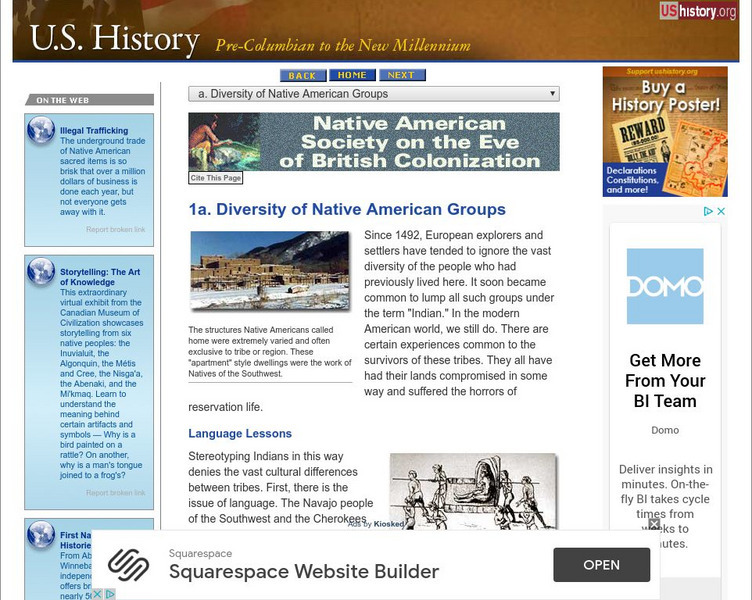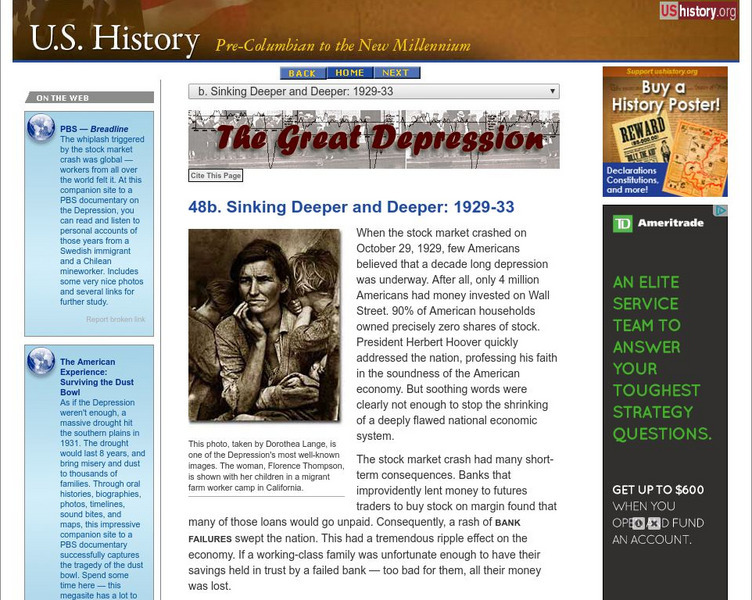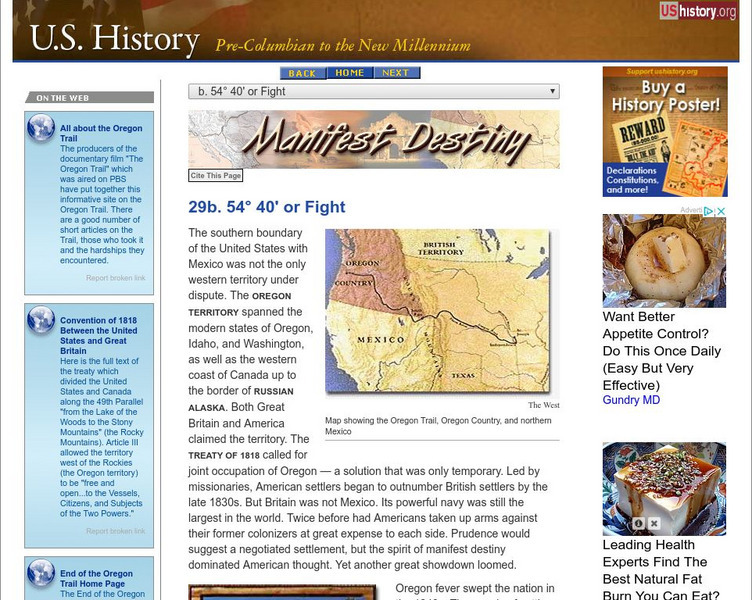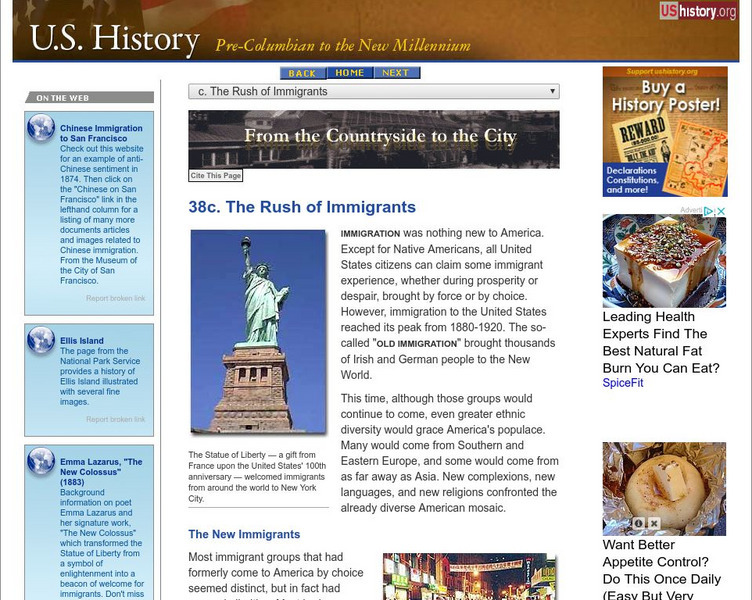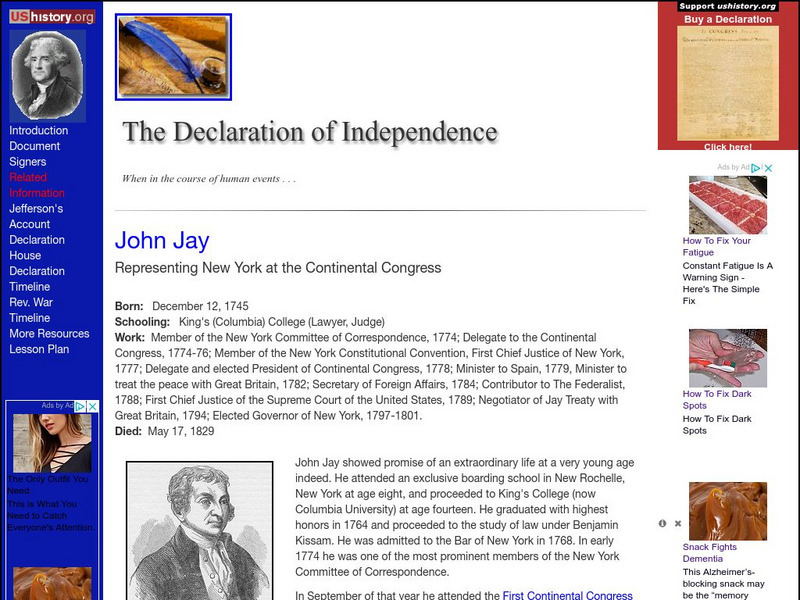Independence Hall Association
U.s. History: The Liberty Bell
Use this site to find out many facts about the Liberty Bell: the size, composition, and location of the bell, as well as history, facts, trivia, and photos.
Independence Hall Association
U.s. History: The American Revolution
A brief overview of the battles and their individual and collective importance in the Revolutionary War. Find out about the battle that turned the tide and brought about needed French assistance.
Independence Hall Association
U.s. History: American Revolution: American and British Strengths and Weaknesses
Read a brief overview of the strengths and weaknesses of both the Americans and British in the Revolutionary War. How could such a well-funded, militarily strong country be defeated by a former colony, one with no money, little military...
Independence Hall Association
U.s. History: Rebuilding the Old Order
Reconstruction in the South engendered corruption, greed, a poor economy, and a backlash against the idea of allowing freed slaves to take part in political and civic life. Read about the formation of paramilitary groups who attempted to...
Independence Hall Association
U.s. History: Britain in the New World
Read about the early English explorers and find out why other countries did much more early exploration than the British. The defeat of the Spanish Armada turned the tide. Discover why the English now could explore and plant colonies.
Independence Hall Association
U.s. History: The Fight for Reproductive Rights
Along with demands for other rights in the 1960s and 1970s came the demand for reproductive rights. Read the development of ideas from the introduction of birth control pills in 1960 to the contentious Supreme Court ruling in Roe v Wade...
Independence Hall Association
U.s. History: Social Change and National Development
As the United States grew geographically, along with developing a national identity, there was also an increasing identity with regionalism. Read about the various regions, along with the changes in economics and religion in this period...
Independence Hall Association
U.s. History: Diversity of Native American Groups
Look at the diversity in language, housing, government, and language among the Native American tribes that existed before the Europeans made contact. There is a brief discussion of the Navajo language and the use of Navajo code talkers...
Independence Hall Association
U.s. History: Wartime Diplomacy
Both the North and South wanted the British and French to support their cause. Read about cotton diplomacy, which the South used to court both Britain and France. See how the North was tied to Great Britain. Find out why both European...
Independence Hall Association
U.s. History: Revolutionary Achievement: Yeomen and Artisans
Perhaps the most revolutionary result of the American Revolution was the rise in importance in politics of the moderately wealthy artisans and yeomen. Read about why this was such an amazing change in the make-up of those involved in...
Independence Hall Association
U.s. History: Sinking Deeper and Deeper
Read about the creeping descent into depression in the United States upon the crash of the stock market. Find out how the economy collapsed, and how that affected employment and the lives of millions.
Independence Hall Association
U.s. History: Fads and Heroes
A time of fads and hero worship, the 1920s' entertainment didn't always make sense, but it was interesting. Find out about some of the fads of the time, and who became the heroes of popular culture. Take a brief quiz about the 1920s.
Independence Hall Association
U.s. History: Woodrow Wilson's New Freedom
Read about the domestic legislation of Woodrow Wilson, a progressive president who won the election of 1912. See how the policies he proposed won him the support of those who believed in the platform of the Bull Moose Party.
Independence Hall Association
U.s. History: Sports and Leisure
Read about the options for leisure time in the Gilded Age for the typical American. Baseball, vaudeville, and bicycling all came into their own in the 1890s.
Independence Hall Association
U.s. History: The Glamour of American Cities
You can't keep them down on the farm! Read about the glamour and allure of the city in the late 19th century where electricity and skyscrapers, along with other thechnological advances, enticed people into the city from the country.
Independence Hall Association
U.s. History: u.s. Military Defeat: Indian Victory in the West
Read about the Whiskey Rebellion and what caused farmers to protest to the point of rebellion. Understand why a federal military response was such a grave decision.
Independence Hall Association
U.s. History: Shays' Rebellion
Read about the Massachusetts government's handling of the crushing debt felt by the farmers in western Massachusetts and the resulting rebellion by those farmers.
Independence Hall Association
U.s. History: Britain in the New World: The Growth of the Tobacco Trade
Many colonists came to Jamestown to find gold. Read about what finally brought money into the colony, and what John Rolfe's role was in that. Read about who the workers were who provided the labor for this new money source.
Independence Hall Association
U.s. History: 54 40 or Fight
See how James Polk's plan to claim the Oregon Territory, which had been shared with Great Britain since 1818, led him to victory with the slogan, Fifty-four forty or fight. Read about the settlers who traveled the Oregon Trail and why...
Independence Hall Association
U.s. History: The Rush of Immigrants
Read about the new wave of immigrants who came to America in the late 19th century. See differences between these groups of immigrants and those who came earlier. Find out where immigrants settled, and read about those who did not...
Independence Hall Association
U.s. History: The Sickened Economy
The U.S. economy in the 1970s staggered and fell in the 1970s. Read about the reasons for the depressed economy marked by high inflation and high unemployment.
Independence Hall Association
U.s. History: Finding Oneself
A good description of the decade of the '70s, the "Me" decade. Read about the fashions, hairstyles, therapies, and fads that made this decade somewhat absurd.
Independence Hall Association
U.s. History: Independence Hall
Brief history of the "birthplace of the United States", with construction details, and a location map.
Independence Hall Association
U.s. History: John Jay
A brief biography of John Jay's life and political career. Discusses his role in the First Continental Congress and authoring of three articles that are now collectively known as "The Federalist."

